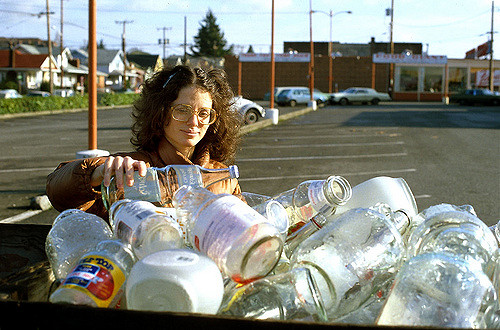
The issue: Green labels that promise consumers their purchases are eco-friendly appear on all sorts of goods these days, from yogurts to urinals. The label can mean many things: The item has sustainable packaging. It’s organically grown. It’s locally made. Or it is just a little less damaging to the planet. With growing concern from government officials and others about pollution and climate change, going green is a hot marketing strategy.
But is the push to be more environmentally friendly working?
Scholars have found that men tend to litter more, recycle less, have a larger carbon footprint, and feel less responsible than women for environmentally destructive behavior. In general, environmental concerns are more associated with femininity than masculinity, according to a 2011 study by the public-relations firm Ogilvy & Mather that has been repeatedly cited in academic research.
So how can men be encouraged to recycle?
An academic study worth reading: “Is Eco-Friendly Unmanly? The Green-Feminine Stereotype and Its Effect on Sustainable Consumption,” published in the Journal of Consumer Research, August 2016.
Study summary: Aaron Brough, an assistant professor of marketing at Utah State University, and James E.B. Wilkie, an assistant professor of business at the University of Notre Dame, led a study that examines why men are less likely than women to engage in so-called green behaviors. Brough, Wilkie and their colleagues hypothesize that men are more likely to avoid green behavior “in order to safeguard their gender identity.” This group of scholars draws on previous research, which shows not only that concern for the environment is stereotypically associated with femininity, but that “men tend to be more concerned than women with gender-identity maintenance.”
Women’s greater concerns about the environment — an effect that has been documented across age groups and countries — may be because women have been associated with more concern with the future and health. Brough, Wilkie and colleagues sought to understand the underlying reasons for men’s un-green behavior. They designed seven experiments — including one carried out in China — to gauge whether male behaviors can be changed.
Findings:
- Men are more likely to donate to an environmental non-profit organization that has an overtly masculine logo or branding than to an organization that is perceived as being feminine. Such an effect was not recorded in women.
- Men are less likely than women to buy products marketed as environmentally friendly, or “green.”
- Both men and women perceive consumers who buy green products and make efforts to recycle as more feminine.
- Both men and women view green products as less masculine than non-green versions of the same products.
- Women are unlikely to be concerned if packaging looks masculine.
- Men’s disinclination for green behavior “may be partially explained by an association between green behavior and femininity that threatens the gender identity of men.”
- Men are more likely to avoid green products in public as well as in private, suggesting they are concerned both with managing judgments of themselves, as well as their own self-perception.
Other resources for journalists writing about this issue:
Activist groups such as the Environmental Defense Fund — which successfully lobbied McDonald’s to stop using polystyrene containers — Greenpeace and the Natural Resources Defense Council list detailed information on their websites about environmental threats and ways to help.
The U.S. Environmental Protection Agency hosts resources dedicated to its Congressionally mandated mission: “to protect human health and the environment.”
There are a number of for-profit and non-profit organizations — including the U.S. Small Business Administration, a government agency — that offer guidance on how to utilize environmental concerns in marketing campaigns.
Other useful research:
The Pew Research Center regularly conducts polls on Americans’ attitudes toward the environment and sustainability. An April 2016 poll found Americans split by political party on how much the government should make environmental protection a priority. Ninety percent of Democrats and 52 percent of Republicans say the United States should “do whatever it takes to protect the environment.” (In 1994, Pew found 85 percent of Democrats and 71 percent of Republicans agreed with the statement.) Most Americans recycle at least sometimes, according to the 2016 poll, and 39 percent identify as environmentalists.
Keywords: environmentalism, global warming, plastics, garbage, planet earth, gender stereotypes, recycling, environmentally friendly, eco-friendly
